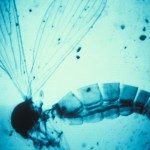Lien vers Pubmed [PMID] – 29261661
Lien DOI – 10.1371/journal.pntd.0006152
PLoS Negl Trop Dis 2017 12; 11(12): e0006152
Dengue virus (DENV) causes more human infections than any other mosquito-borne virus. The current lack of antiviral strategies has prompted genome-wide screens for host genes that are required for DENV infectivity. Earlier transcriptomic studies that identified DENV host factors in the primary vector Aedes aegypti used inbred laboratory colonies and/or pools of mosquitoes that erase individual variation. Here, we performed transcriptome sequencing on individual midguts in a field-derived Ae. aegypti population to identify new candidate host factors modulating DENV replication. We analyzed the transcriptomic data using an approach that accounts for individual co-variation between viral RNA load and gene expression. This approach generates a prediction about the agonist or antagonist effect of candidate genes on DENV replication based on the sign of the correlation between gene expression and viral RNA load. Using this method, we identified 39 candidate genes that went undetected by conventional pairwise comparison of gene expression levels between DENV-infected midguts and uninfected controls. Only four candidate genes were detected by both methods, emphasizing their complementarity. We demonstrated the value of our approach by functional validation of a candidate agonist gene encoding a sterol regulatory element-binding protein (SREBP), which was identified by correlation analysis but not by pairwise comparison. We confirmed that SREBP promotes DENV infection in the midgut by RNAi-mediated gene knockdown in vivo. We suggest that our approach for transcriptomic analysis can empower genome-wide screens for potential agonist or antagonist factors by leveraging inter-individual variation in gene expression. More generally, this method is applicable to a wide range of phenotypic traits displaying inter-individual variation.






